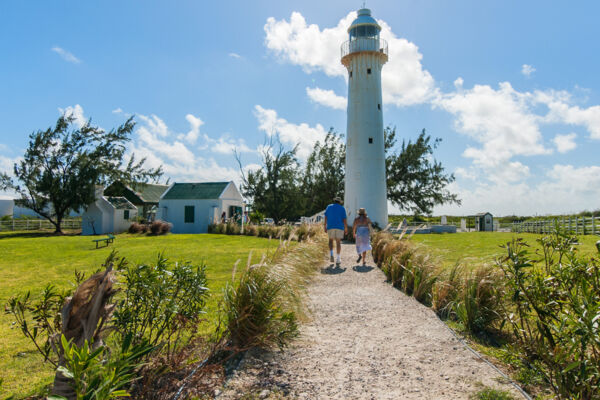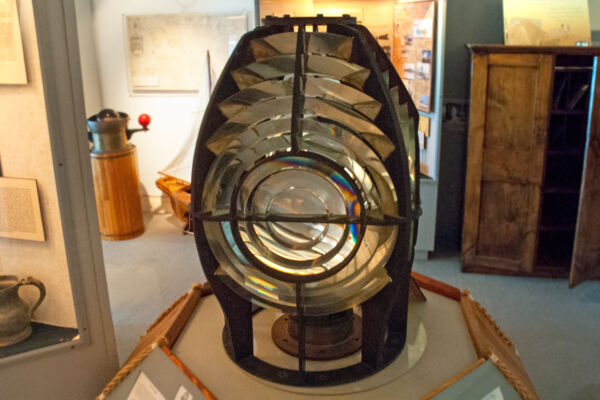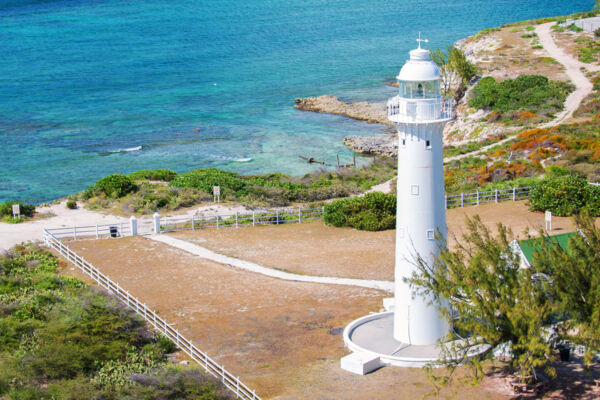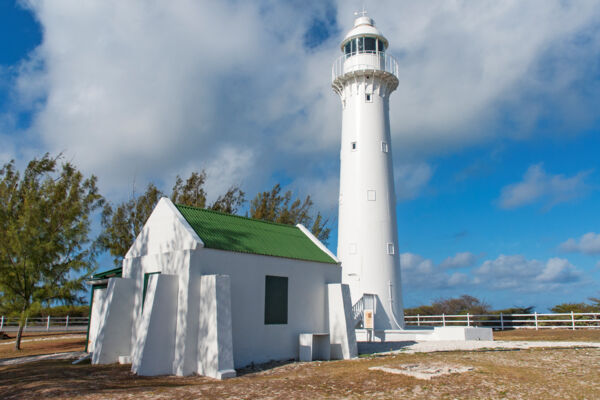Grand Turk Lighthouse
Lighthouse Road, Grand Turk
Built in 1852, this lighthouse is Grand Turk’s most famous landmark and is the only lighthouse in the Turks and Caicos Islands. In the early 19th century, many ships wrecked off the northern coast of Grand Turk. There reached a point where shipping firms (primarily American and Bermudian) and the U.K. and U.S. governments insisted that a lighthouse be built to aid in navigation.
The lighthouse is no longer operational, yet the grounds are open for tourism. Access into the lighthouse is not allowed.
The Attraction Today

The grounds of the Grand Turk Lighthouse are open to visitors. There’s a $3 admission charge per person for entry (which can be applied towards the cost of a beverage or item from the onsite shop), and some tours may include admission as part of a package.
There’s a small snack and gift shop in the old lightkeeper’s house, and a scenic coastal path that leads along the top of the marine limestone cliffs of the coastline.
Directly adjacent to the east of the lighthouse are the ruins of the 1950s-era U.S. Navy NAVFAC 104 base. Although not an official tourist attraction, this site is nevertheless interesting.
The cute and hardy Turks and Caicos donkeys can usually be seen wandering in this region of Grand Turk.
Getting to the Grand Turk Lighthouse
The lighthouse is located on the opposite side of the island from the Grand Turk Cruise Center and several miles from the center of Cockburn Town, where most of the island’s accommodations are located.
It’s not feasible to walk or cycle to the site unless you’re staying in the Lighthouse Road area.
Taxis and rental cars are the only common means of transport. If you’re staying overnight on Grand Turk, or are visiting from Providenciales on a day trip, it's best to rent a car or scooter.
Island tours and ATV excursions typically visit the Grand Turk Lighthouse as one of the day’s stops.
History of the Grand Turk Lighthouse

The reefs of the Turks and Caicos have always been treacherous, and North Reef off the northern end of Grand Turk claimed a significant number of vessels.
The catalyst for the construction of the lighthouse was the wreck of the R.M.S Medina in 1842, the first British Royal Mail Service ship to sink at sea. In the early 1850s, Turks and Caicos President Frederick Henry Alexander Forth initiated the construction of this landmark.
The main structure was designed by Alexander Gordon and was prefabricated in England. It’s an early example of cast-iron prefabrication, and one of the first of its type. Originally, the lighthouse was designed to burn whale oil (the origin of which was likely Salt Cay) and had Argand reflector lamps. These reflector lamps magnified light to 450 times the original intensity. The clock-like machinery (to rotate the light) was designed by Chance Brothers of Birmingham, England.

In 1943, the same Chance Brothers converted the lighthouse to run on kerosene and fitted Fresnel lenses. One of these lenses is on display at the National Museum. In 1971, the lighthouse was converted to run on electricity.
On the grounds is the small lightkeeper’s house, with small windows to block the intense light from the tower.
Original light visibility was 15 miles (24 km). The tower stands at 60 feet (18 m), a total of 108 feet (33 m) above sea level.
The French Lighthouse
Grand Turk wasn’t the only site considered for a lighthouse in the Turks and Caicos.
The tiny and remote island of French Cay, located on the southern Caicos Banks, once saw serious investigations by France for the construction of a lighthouse in the mid-1700s. This period of time was before the Haitian Revolution, when France still controlled Hispaniola (which was only a two-day sail away).
